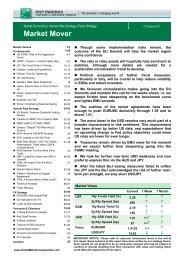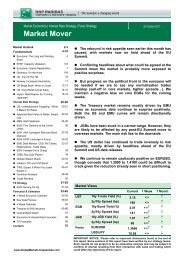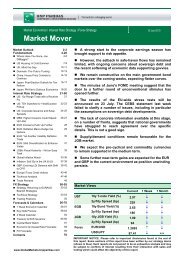MARKET MOVER - BNP PARIBAS - Investment Services India
MARKET MOVER - BNP PARIBAS - Investment Services India
MARKET MOVER - BNP PARIBAS - Investment Services India
Create successful ePaper yourself
Turn your PDF publications into a flip-book with our unique Google optimized e-Paper software.
inflation rate is calculated excluding taxes on<br />
consumption, the rise should have no impact on this<br />
measure of inflation (unless providers raise their<br />
prices beyond the VAT tax hike).<br />
Most other measures taken to reduce tax loopholes<br />
will affect household income tax, taxes on savings or<br />
social contributions – none of which are included in<br />
the CPI.<br />
Reducing the health care deficit…<br />
None of the measures included in the pension reform<br />
has a direct impact on inflation. The other major<br />
cause of the deficit is health care, since the share of<br />
health care in total household consumption is on the<br />
rise in France (as elsewhere). Health care costs<br />
amounted to EUR 2,724 per person last year, the<br />
bulk of which was financed by social security (75.5%,<br />
Chart 3). Public financing of health care amounts to<br />
6.5% of GDP.<br />
In order to reduce the social security deficit, further<br />
tightening of rules on health care reimbursement will<br />
be implemented next year, according to reports in the<br />
media. The changes should generate EUR 2.5bn in<br />
2011, which compares to a projected social security<br />
deficit of EUR 12bn for 2010. The economic<br />
slowdown has reduced the pace of increase in health<br />
care expenditure (as some people have cut back on<br />
poorly reimbursed, non-urgent spending such as<br />
dentistry or glasses).<br />
The prices of some goods (medicines) and services<br />
(especially biological tests and radiological<br />
examination) will be cut but the reductions will be<br />
partially offset by an increase in the standard price of<br />
a doctor's examination (from EUR 22 to EUR 23 on<br />
1 January 2011). Overall, the measures will push CPI<br />
inflation down by about 0.06pp. These measures will<br />
be implemented progressively over the course of<br />
2011, as has been the case this year.<br />
The share of standard health services reimbursed by<br />
social security (i.e. excluding hospital or care for<br />
chronic and severe diseases) will be reduced from<br />
70% to 69.5%. The share paid by private insurers will<br />
thus rise from 30% to 30.5%. It is likely that drugs<br />
which are currently reimbursed at 35% by social<br />
security will be reimbursed at 30% only. The HICP,<br />
unlike the CPI, does not capture the full price of<br />
health goods and services but only the proportion<br />
which is not reimbursed by social security. As a<br />
result, the HICP will not benefit as much from lower<br />
prices for health goods and services as the CPI (this<br />
is the main source of divergence between the two<br />
measures of inflation).<br />
Higher contribution rates for social security,<br />
especially for accidents and sickness that occur in<br />
13.8%<br />
Chart 3: Health Care Financing in 2009<br />
9.4%<br />
Source: Le Figaro<br />
1.3%<br />
75.5%<br />
State<br />
Soc. Sec.<br />
Priv. Ins.<br />
the workplace, will result in a EUR 0.8bn increase in<br />
receipts. This will come on top of the natural increase<br />
in social contributions paid by private companies;<br />
these should reach about EUR 3.0bn in 2011, up<br />
from about EUR 2.0bn this year on the back of<br />
increases in employment and wages.<br />
…will also increase the cost of private insurance<br />
A significant share of the social security savings will<br />
result in higher costs for private health insurers,<br />
which cover about 60% of the expenditure not<br />
reimbursed by the public system. However, this<br />
should be compensated by lower prices for some<br />
goods and services.<br />
Nevertheless, private insurance companies will have<br />
to raise their prices (partly paid by employers in large<br />
corporations). A favourable tax regime has been<br />
available for private health insurance, with most<br />
players taking advantage of it. This is one of the tax<br />
loopholes that will disappear in 2011, adding<br />
EUR 1.1bn to insurers’ fiscal burden (and to CADES<br />
income). Overall, private health insurers may have to<br />
hike their rates by 5-8% next year. This would add<br />
around 0.09pp to headline CPI (private health<br />
insurance has a 1.05% weighting in 2010 and this<br />
will rise over time), or 0.10pp to the HICP (where the<br />
weighting is 1.14%).<br />
Altogether, the new measures should result in a<br />
0.26pp contribution in headline CPI inflation in 2011,<br />
raising it from 1.13% to 1.39%. The increase should<br />
be limited to 0.16pp for ex-tobacco CPI, which would<br />
reach 1.32%. The fiscal impact on the headline HICP<br />
is more important at 0.35pp. The 1.5% harmonised<br />
inflation rate we expect would nevertheless be one<br />
tenth below that of the eurozone, which also<br />
incorporates the inflationary impact of fiscal policies<br />
in different countries and higher contribution of food<br />
prices.<br />
Hh<br />
Total:<br />
EUR 162.4bn<br />
Dominique Barbet 23 September 2010<br />
Market Mover<br />
13<br />
www.GlobalMarkets.bnpparibas.com
















